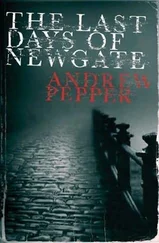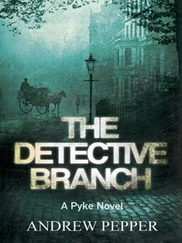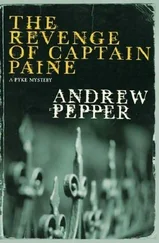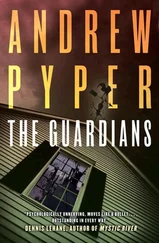Her contentment had been so great and without precedent that she’d almost forgotten about the terrible man who does terrible things. It had been a while since her night thoughts had been interrupted by his appearance. So it is with the most awful kind of surprise when she comes home from school one afternoon in late autumn to overhear Edra and Jacob talking about a little girl who’d disappeared from town.
Thirteen years old. The same age as her. Playing outside in the yard one minute, gone the next. The police and volunteer search parties had looked everywhere for her, but for three days the missing girl remained missing. The authorities were forced to presume foul play. They had no suspect in mind. Their only lead was that some in town had lately noticed a stranger walking the cracked sidewalks at night. A tall, sloped-shouldered man, a figure who kept to the shadows. "A man with no face,” was how one witness put it. Another said it seemed the man was searching for something, though this was an impression and nothing more. Aside from this, no details were known of him.
But they were known to the girl. For she knew who the dark figure was even though she wasn’t there to see him. She knew who had taken a girl in town the same age as her. The Sandman. Except now he’d escaped the constraints of her dream world and entered the real, where he could do all the terrible things he desired to do.
The girl was certain of all this, along with something else. She knew what the Sandman searched for as he walked in the night shadows.
He searched for her.
Write What You Know.
This is one of the primary Writers’ Rules, though an unnecessary one, as the initial inclination of most is toward autobiography anyway. The imagination comes later, if it comes at all, after all the pages of the family photo album have been turned, love affairs autopsied, coming-of-age revelations and domestic tragedies rehashed on the page. Usually, people find their own lives sufficiently fascinating to never have to confront the problem of making things up. The Kensington Circle is no exception. Evelyn’s campus sexcapade, Petra’s marital breakdown, Ivan’s sewer-rat metamorphosis. I’m jealous of them. It would make writing so much easier if I never tired of seeing the same face in the mirror.
But what if you don’t particularly find the life you know all that interesting? Real, yes. And marked by its share of loss, redeemed by the love of a son with eyes the colour of his mother’s. It’s just that I don’t see my life as satisfactory material to present as fiction. I find it challenge enough just muddling along as who I am, never mind casting myself as hero.
This is the reasoning I call on when, as now, I try to squeeze out a paragraph to be read at the next circle meeting, and nothing comes. I’m taking lunch at my desk, gnawing on a cafeteria hamand-cheese, randomly pecking at the keys of my computer. Tim Earheart, who finds my literary aspirations perplexing (“Why do you think anybody would pay to read the shit you’re pulling out of your ass?” is how he put it to me, unanswerably, when I told him of my attendance at a fictionwriting circle), comes by to read over my shoulder.
“I’m no judge,” he says, “but I’m not sure you’re going anywhere with this.”
He’s right. Over the next hour and a half, only a few sentences remain on the screen.
Here’s what good Write What You Know has done for me today:
After my wife died I started hearing voices. Just hers at first. And then others I’ve never heard before. Strangers. I can’t know this for sure but I have the feeling that all of them are dead.
They come to me before I go to sleep. This is what frightens me. Not that they’re dead, or that I can hear them. But that I’m awake when I do.
Once this passage of luminous prose has been accomplished, I turn my mind to my Couch Potato column for the weekend edition. This week it’s a gloves-off attack on the Canadian franchise of American MegaStar!, a talent show that is the toprated program in this country, as well as the fourteen others it has colonized. An entire, worldwide generation being led to believe they are entitled to be famous. It’s toxic. A lie. It’s wrong . And it’s also how my frustration with Writing What I Know opens the gates to Writing How the World Has Gone to Crap, which has never been much of a problem for me.
Even though I know that Canadian MegaStar! is owned by the same multinational media behemoth that owns the paper I work for, and even though there have been ominous hints from the section editor to “go easy” on “content” which is produced by said behemoth, I let slip the dogs of war on MegaStar! as if it is single-handedly responsible for carrying out a cultural atrocity. In fact, this last phrase makes it into the lede. From this measured opening, the column goes on to be brutal, hyperbolic and libellous, all leading to the kind of hysterical finish where you’re actually a little concerned about the mental health of the column’s author. It’s personal .
I stay at work late (Thursdays keep me at the office at least until midnight copyediting the Best on the Box listings) and walk home wondering if today will prove to be my last in my current position. Or, come to think of it, my last in any position. It’s almost amusing to wonder what else I might be qualified to do. I’ve always rather liked the idea of running my own business. Something very hands off. Automated, preferably. A laundromat. A spray-it-yourself car wash.
I round the corner on to my street speculating over what kind of pay cut, if any, would be involved in delivering newspapers instead of writing for them, when I notice the yellow police tape around the house across from mine. It is the neighbouring family at 147, and not my own family at 146 that the four police cruisers are parked in front of. But I still run the half-block up Euclid, ring the bell at my front door after twice dropping the keys, and confirm my son is safe with Emmie before going back out to ask the cop turning traffic back toward Queen what’s going on.
“Break and enter,” he says, chewing the inside of his cheek.
“What’d they take?”
“Didn’t touch a thing. The kid was the only one who saw him.”
“Joseph. My boy plays with him sometimes.”
“Yeah? Well, when Joseph woke up tonight some son of a bitch was standing over his bed.”
“Was he able to give a description?”
“All he can say is the guy’s a shadow.”
“A shadow?”
“Went downstairs to the living room with the kid following behind him. Just stood at the front window, staring out at the street. Then, after a while, he walked out the front door as if he owned the place. Turn it around, buddy! Yeah, you !”
The cop steps away to have a word with whoever’s behind the wheel of the SUV that refuses to head back to Queen. It gives me a chance to walk up on to the neighbour’s patch of lawn and stand with my back to their front window. The same view the shadow would have had, standing behind the glass.
Staring at my place.
Where Sam is now. Standing next to Emmie on the porch, squinting over at me.
I read the nanny’s lips— Wave to Daddy! —and Sam raises his chubby arm in salute. And as I wave back I wonder if he can see how bad Daddy’s shaking.
The next circle meeting is at Petra’s house. She had kindly offered to host all of us the week before, though as I step out of my cab at her Rosedale address, I see she was being modest to the point of insult when she described her digs as “Nothing too fancy”. The place is a mansion. Copper roof, terraced landscaping that looks expensive even under a couple inches of snow, matching Mercedes coupés (one red, one black) docked in the carport. It makes me wonder how much the husband had before the divorce if this is Petra’s cut.
Читать дальше












